huide
thread rolling machine
As a professional thread rolling machine manufacturer, we have an experienced and innovative R&D team that constantly launches new products that meet market demand and continuously improves the performance of existing products to improve product quality and stability. Our thread rolling machines have advanced production technology and equipment. From raw material selection to production and processing, they are produced in strict accordance with international standards and have reliable quality. Our target customers are all customers from all over world( Nicaragua,Barbados,Senegal,Ethiopia,South Africa,Panama,Slovenia,North America, America, Africa and Oceania) who need our product.
In addition to product quality, we also focus on customer service. We have a professional pre-sales consultation and after-sales service team to provide customers with considerate and thoughtful pre-sales technical consultation and after-sales technical support to meet customers' individual needs. In addition, we also provide customized services, designing and producing thread rolling machines according to customers' special needs, and providing customers with the best solutions.
| Product name | thread rolling machine |
| Keyword | what is a thread rolling machine,rebar thread rolling machine supplier,cylindrical thread rolling machine manufacturers,high speed thread rolling machine,taiwanese thread rolling machine,wholesale thread rolling machine,hs code for hydraulic thread rolling machine,fully automatic thread rolling machine |
| Place of Origin | China |
| Production Capacity | 226~400/Per Min |
| Power | 2.2~6kw |
| Thread Dia(mm) | 2.0~4.0 |
| Thread Length(mm) | 9~50 |
| Feature | pipe nipple threading machine in its rolling pressure range of cold, the workpiece for thread, ruled, twill and other treatment; straight, helical and oblique spline gear rolling; straightening, reducing diameter, rolling and various forming rolling. |
| Dimensions | 1535mm*1558mm*1782mm, (Contact us for specific information to confirm) |
| Applicable Industries | Machinery Repair Shops, etc. |
| Color | Ash or customized |
| Weight | 2688kg |
| Product Description | The machine has a safe and reliable electro-hydraulic execution and control system. Each work cycle can be selected in manual, semi-automatic and automatic ways. |
| terms of packing | enerally, we pack our goods in plywood cases. |
| terms of paymen | T/T 30% as deposit, and 70% balance against BL copy |
| Life span | 16 years (Contact us for specific information to confirm) |
| After-sale service | 12 months warrantly, man-made destory will be exception. |
| thread rolling machine Advantage | We keep good quality and competitive price to ensure our customers benefit |
| Packing | 2845x2103x1436mm(Contact us for specific information to confirm) |
| OEM/ODM | Customization Service Provided |
| Sales country | All over the world for example:Nicaragua,Barbados,Senegal,Ethiopia,South Africa,Panama,Slovenia |
| MOQ | 8pcs(Contact us for specific information to confirm) |
| Delivery time | 15-20 days for OEM, 5-7days for ready goods. |


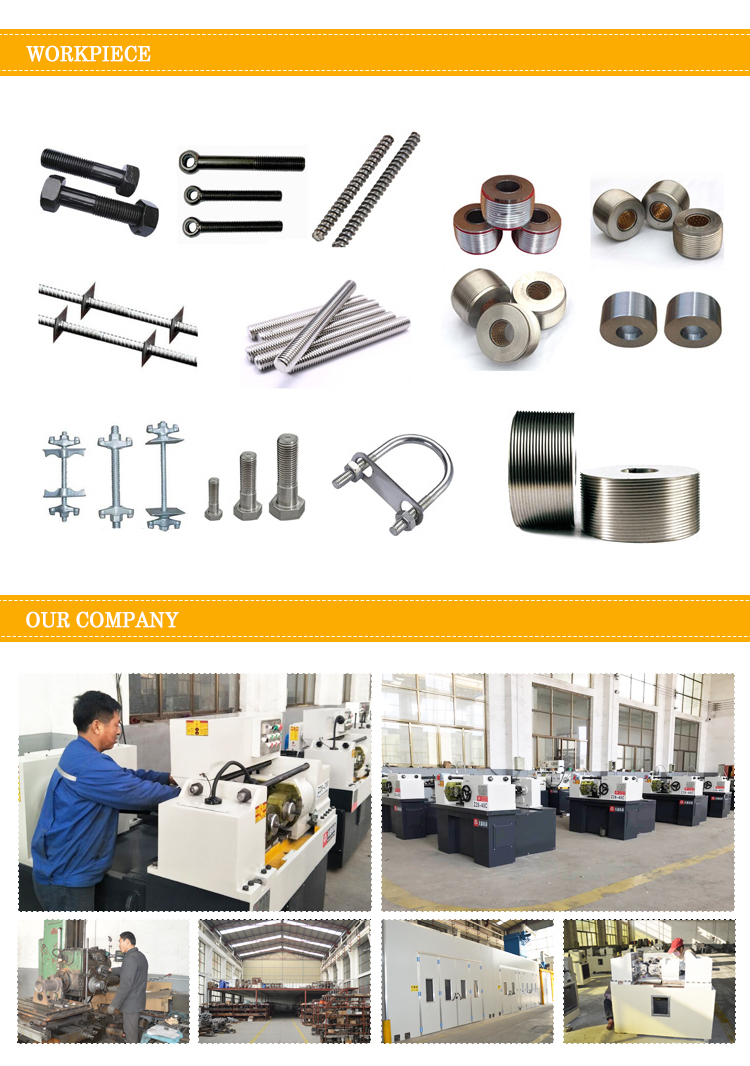




thread rolling machine
huide-machinery.as one of the most professional thread rolling machine manufacturer has the advantages at:
We are the leader thread rolling machine supplier in China, also we have customers worldwide, such as America, Argentina, Brazil, Belarus, Bangladesh, Nicaragua,Barbados,Senegal,Ethiopia,South Africa,Panama,Slovenia, and Italy.We are factory specializing in the manufacture and export of thread rolling machine for more than 20 years, all of the production we sale are at a very best price and high quality.
We take care of our product quality, any defect of the goods, we will take responsibility. You are risk-free.And we believe that the good quality products will can give us survival, so, we always offer the top quality products to our customers, to keep them have the competitiveness in there market.
thread rolling machine services FAQs Guide
Are you looking for a quick review guide about thread rolling machineservices?
An ultimate FAQ buying guide is available to help you.This guide contains all the information about all the important facts, figures, and various processes regarding thread rolling machine services.
Let’s continue!
2.What are the Different thread rolling machine Drive Types?
3.Can a thread rolling machine handle both internal and external threads?
4.Can thread rolling be used on already machined parts?
5.What are the main features of a high-quality thread rolling machine?
6.What materials can be used with a thread rolling machine?
7.Can a thread rolling machine Create Threads on Hard Materials?
8.Can a thread rolling machine handle different thread types such as ACO, UNF, or NPT?
9.What does your factory produce ?
10.What are the most common applications for a thread rolling machine?
11. If the machine get damaged, what can I do ?
12.What are the Advantages of Using a thread rolling machine in Production?
13.What is the lifespan of a thread rolling machine?
14.How Does the Thread Rolling Process Work?
1.How Accurate are Threads Created by a thread rolling machine?
We are centered on customers and always pay attention to customers' needs for thread rolling machine products.
Threads created by a thread rolling machine are highly accurate and precise. This is because thread rolling is a cold forming process that uses pressure to deform the material into the desired thread shape. This results in a thread with a smooth surface and consistent dimensions.
The accuracy of threads created by a thread rolling machine depends on several factors such as the quality of the machine, the material being rolled, and the skill of the operator. However, in general, thread rolling machines can produce threads with tolerances as tight as 0.0005 inches.
Compared to other methods of creating threads, such as cutting or grinding, thread rolling offers superior accuracy and consistency. This is because the material is not removed during the process, resulting in a stronger and more precise thread.
In addition, thread rolling machines are designed to produce threads with high repeatability, meaning that each thread produced will be nearly identical to the previous one. This makes them ideal for high-volume production of threaded parts.
Overall, the accuracy of threads created by a thread rolling machine is very high, making it a preferred method for creating threads in various industries such as automotive, aerospace, and construction.
2.What are the Different thread rolling machine Drive Types?
Being one of the top thread rolling machine manufacturers in China, We attach great importance to this detail.
1. Mechanical Drive: This type of drive uses a motor and gears to power the thread rolling machine. The motor drives the gears, which in turn rotate the dies to create the threads.
2. Hydraulic Drive: In this type of drive, a hydraulic pump is used to power the thread rolling machine. The pump creates pressure, which is used to rotate the dies and create the threads.
3. Pneumatic Drive: A pneumatic drive uses compressed air to power the thread rolling machine. The air is used to rotate the dies and create the threads.
4. Servo Drive: This type of drive uses a servo motor to power the thread rolling machine. The motor is controlled by a computer, which allows for precise control over the rotation of the dies.
5. Electric Drive: An electric drive uses an electric motor to power the thread rolling machine. The motor is connected to the dies and rotates them to create the threads.
6. Direct Drive: In this type of drive, the dies are directly connected to the motor without any gears or other components. This allows for a more efficient transfer of power and faster thread rolling.
7. Belt Drive: A belt drive uses a belt to transfer power from the motor to the dies. This type of drive is commonly used in smaller thread rolling machines.
8. Chain Drive: Similar to a belt drive, a chain drive uses a chain to transfer power from the motor to the dies. This type of drive is commonly used in larger thread rolling machines.

3.Can a thread rolling machine handle both internal and external threads?
We focus on our customers' needs and strive to meet their expectations, so we take this very seriously.
Yes, some thread rolling machines are designed to handle both internal and external threads. These machines have different sets of dies and adjustments to accommodate the different types of threads. However, some machines may only be able to handle either internal or external threads, so it is important to check the specifications of the specific machine.
4.Can thread rolling be used on already machined parts?
We maintain a stable growth through reasonable capital operations, focus on industry development trends and cutting -edge technologies, and focus on product quality and safety performance.
Yes, thread rolling can be used on already machined parts. However, the part must have a smooth and clean surface in order for the thread rolling process to be successful. Any imperfections or roughness on the surface can affect the quality of the thread formed by the rolling process. Additionally, the part must have the correct dimensions and tolerances to ensure proper thread formation during the rolling process.

5.What are the main features of a high-quality thread rolling machine?
We have a wide range of thread rolling machine customer groups and establishes long -term cooperative relationships with partners. The countries we provide services include Nicaragua,Barbados,Senegal,Ethiopia,South Africa,Panama,Slovenia.
1. Robust Construction: A high-quality thread rolling machine should have a sturdy and durable construction to withstand the high pressure and stress of the rolling process.
2. Precision and Accuracy: The machine should be able to produce threads with high precision and accuracy, ensuring consistent and uniform thread quality.
3. High Production Capacity: A good thread rolling machine should have a high production capacity, allowing for efficient and fast production of threaded parts.
4. Easy to Operate: The machine should have a user-friendly interface and controls, making it easy for operators to set up and operate the machine.
5. Versatility: A high-quality thread rolling machine should be able to produce a wide range of thread sizes and types, making it suitable for various applications.
6. Low Maintenance: The machine should be designed for easy maintenance, with readily available spare parts and minimal downtime for repairs.
6.What materials can be used with a thread rolling machine?
We have advanced production equipment and technology to meet the needs of customers, and can provide customers with high quality, low priced thread rolling machine products.
1. Steel: Thread rolling machines are commonly used for rolling threads on steel materials, including carbon steel, alloy steel, and stainless steel.
2. Aluminum: Aluminum is another commonly used material with thread rolling machines. It is lightweight, strong, and has good corrosion resistance, making it suitable for various applications.
3. Brass: Brass is a soft and malleable material that is often used for decorative purposes. It can also be rolled into threads using a thread rolling machine.
4. Copper: Copper is a highly conductive and ductile material that is commonly used in electrical and plumbing applications. It can also be rolled into threads using a thread rolling machine.
5. Titanium: Titanium is a strong and lightweight material that is commonly used in aerospace and medical industries. It can also be rolled into threads using a thread rolling machine.
6. Plastics: Some thread rolling machines are designed to work with plastic materials, such as nylon, PVC, and polyethylene. These materials are commonly used in the production of plastic fasteners and fittings.
7. Composite materials: Thread rolling machines can also be used to roll threads on composite materials, such as fiberglass, carbon fiber, and Kevlar. These materials are commonly used in the aerospace and automotive industries.
8. Other materials: Other materials that can be used with a thread rolling machine include bronze, cast iron, and various types of alloys. The suitability of these materials will depend on the specific machine and its capabilities.

7.Can a thread rolling machine Create Threads on Hard Materials?
Yes, a thread rolling machine can create threads on hard materials. Thread rolling is a cold forming process that uses pressure to deform the material and create threads. This process is suitable for both soft and hard materials, including steel, stainless steel, titanium, and other alloys. The pressure applied by the thread rolling machine can be adjusted to accommodate the hardness of the material, ensuring that the threads are formed without damaging the material. Additionally, thread rolling can produce stronger and more precise threads compared to other methods such as cutting or tapping, making it a preferred method for creating threads on hard materials.
8.Can a thread rolling machine handle different thread types such as ACO, UNF, or NPT?
Our mission is to provide customers with the best solutions for thread rolling machine.
Yes, a thread rolling machine can handle different thread types such as ACO, UNF, or NPT. These machines are designed to be versatile and can be adjusted to produce different thread types by changing the dies or adjusting the machine settings. However, it is important to note that some thread rolling machines may be specifically designed for certain thread types, so it is important to check the machine's capabilities before use.
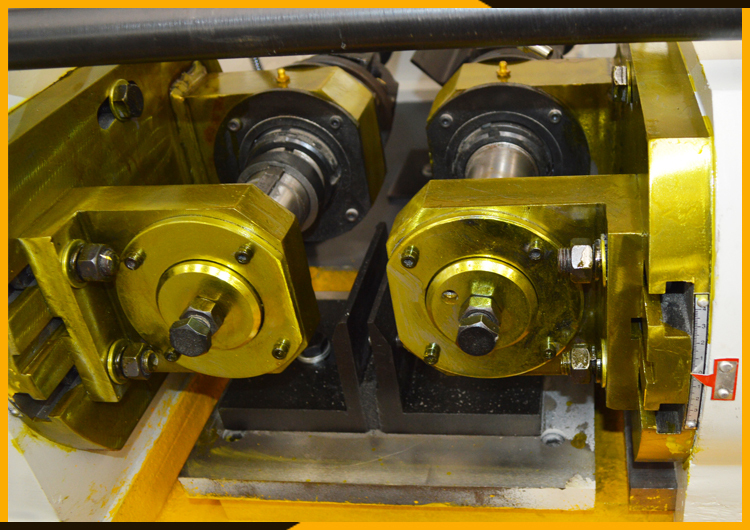
9.What does your factory produce ?
We produce and export all kinds of Reinforced Bar Thread Rolling Machine with butt welding. We also can design and develop automatic wire ring making machines with butt welding according to your requirements.
10.What are the most common applications for a thread rolling machine?
We operate our thread rolling machine business with integrity and honesty.
1. Fastener Manufacturing: Thread rolling machines are commonly used in the production of screws, bolts, and other fasteners. They can produce threads on a variety of materials such as steel, aluminum, and brass.
2. Automotive Industry: Thread rolling machines are used in the production of automotive parts such as engine components, transmission parts, and suspension components. They are also used for repairing damaged threads on automotive parts.
3. Aerospace Industry: Thread rolling machines are used in the production of aerospace components such as aircraft engine parts, landing gear, and structural components. They are also used for repairing damaged threads on aircraft parts.
4. Construction Industry: Thread rolling machines are used in the production of construction materials such as bolts, nuts, and screws. They are also used for repairing damaged threads on construction equipment.
5. Furniture Industry: Thread rolling machines are used in the production of furniture components such as screws, bolts, and dowels. They are also used for repairing damaged threads on furniture pieces.
6. Medical Industry: Thread rolling machines are used in the production of medical devices such as surgical instruments, implants, and orthopedic screws. They are also used for repairing damaged threads on medical equipment.
7. Electrical Industry: Thread rolling machines are used in the production of electrical components such as connectors, terminals, and switches. They are also used for repairing damaged threads on electrical equipment.
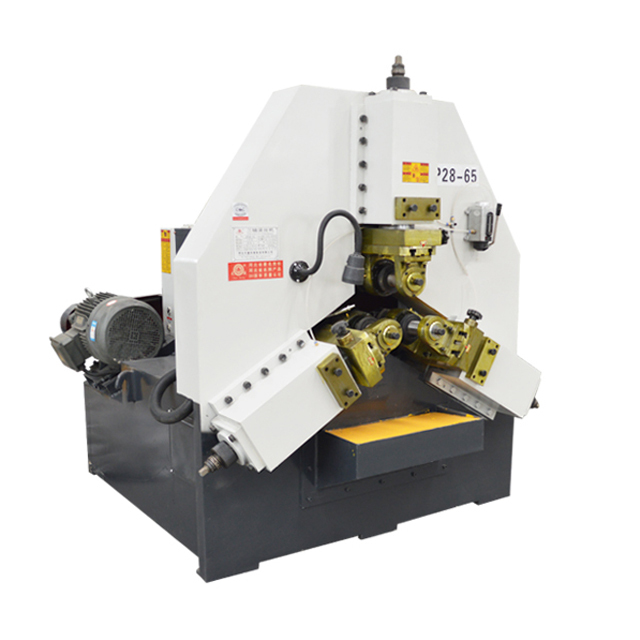
11. If the machine get damaged, what can I do ?
In the guarantee time (15 months) , we will send the spare parts to you for free and provide the technical consultant for anytime. If more terrible, we can send our engineers to your factory. We will provide same good after-sale service as the pre-sale service. For any of your questions, we will reply within 12 hours.
12.What are the Advantages of Using a thread rolling machine in Production?
We focus on providing high thread rolling machine quality products and services.
1. Increased Efficiency: Thread rolling machines are designed to produce threads at a much faster rate compared to traditional methods such as cutting or grinding. This results in increased production efficiency and reduced production time.
2. Cost-effective: Thread rolling machines are cost-effective as they require less maintenance and have a longer lifespan compared to other methods. They also use less energy, resulting in lower operating costs.
3. Consistency and Accuracy: Thread rolling machines produce threads with high precision and consistency, ensuring that each thread is of the same quality. This reduces the chances of errors and rejections, resulting in cost savings for the company.
4. Versatility: Thread rolling machines can produce a wide range of threads, including straight, tapered, and parallel threads. They can also be used to produce threads on a variety of materials, including steel, aluminum, and plastic.
5. Improved Strength: Threads produced by thread rolling machines have a higher tensile strength compared to threads produced by cutting or grinding. This makes them more durable and suitable for use in high-stress applications.
6. Reduced Material Waste: Thread rolling machines produce threads by displacing the material rather than removing it. This results in less material waste, making it a more environmentally friendly option.
7. Easy to Operate: Thread rolling machines are easy to operate and require minimal training. This makes it easier for companies to train their employees and ensure consistent production quality.
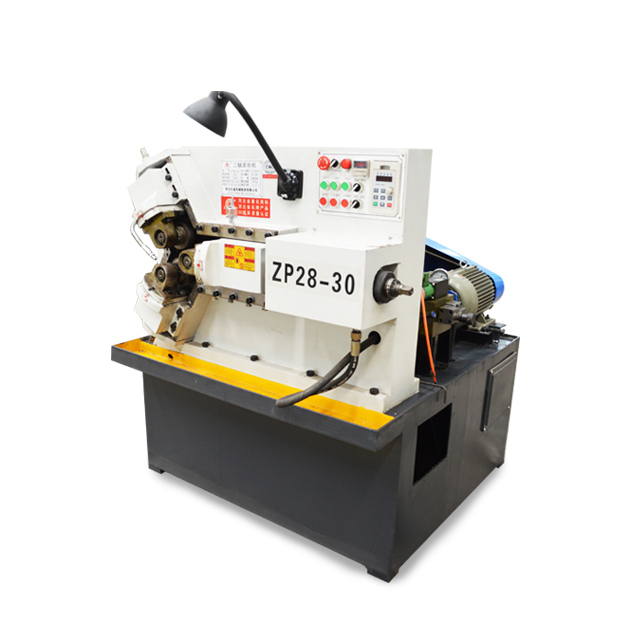
13.What is the lifespan of a thread rolling machine?
We should perform well in market competition, and the prices of thread rolling machine products have a great competitive advantage.
The lifespan of a thread rolling machine can vary depending on factors such as usage, maintenance, and quality of the machine. On average, a well-maintained thread rolling machine can last for 10-15 years. However, with proper care and regular maintenance, some machines can last for 20 years or more.
14.How Does the Thread Rolling Process Work?
We attach importance to the innovation ability and team spirit of employees, have advanced R & D facilities and laboratories, and have a good quality management system.
The thread rolling process is a cold forming process used to create external threads on a workpiece. It involves pressing a hardened steel die onto the surface of the workpiece, causing the material to flow and form the desired thread shape.
The process begins with a blank workpiece, typically a cylindrical rod or bar, which is fed into the thread rolling machine. The machine consists of two dies, an upper and a lower die, which are mounted on parallel spindles and rotate in opposite directions.
The upper die is stationary, while the lower die is adjustable and can be moved up and down to accommodate different thread sizes. The dies are also equipped with thread profiles that correspond to the desired thread shape.
As the workpiece is fed between the two dies, it is gripped and held in place by a set of rollers. The rollers apply pressure to the workpiece, forcing it to deform and flow into the thread profile of the dies.
The dies then rotate, causing the material to be displaced and formed into the desired thread shape. The pressure and rotation of the dies continue until the thread is fully formed.
Once the thread is formed, the dies retract, and the workpiece is released. The thread is then checked for accuracy using gauges and other measuring tools.
The thread rolling process is highly efficient and can produce threads at a much faster rate than traditional cutting methods. It also results in a stronger and more precise thread, making it a preferred method for creating high-quality threads in mass production.
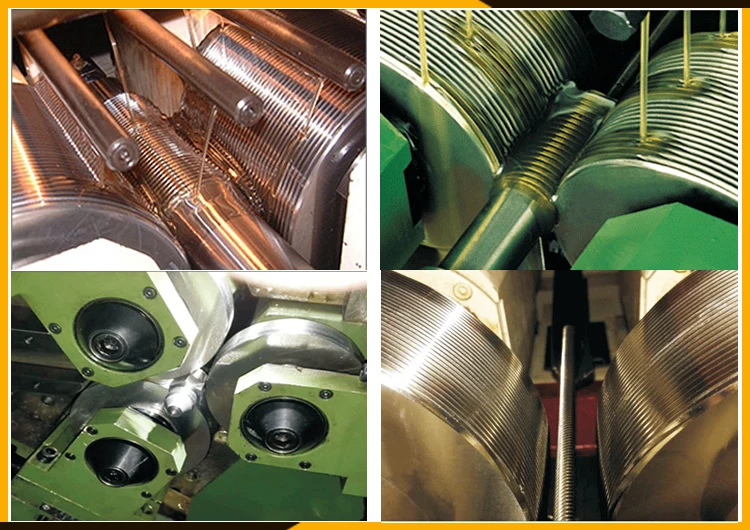
- Place of Origin:
- Video outgoing-inspection:
- Machinery Test Report:
- Marketing Type:
- Warranty of core components:
- Core Components:
- Key Selling Points:
- Applicable Industries:
- Application:
- Condition:
- Production Capacity:
- Voltage:





















